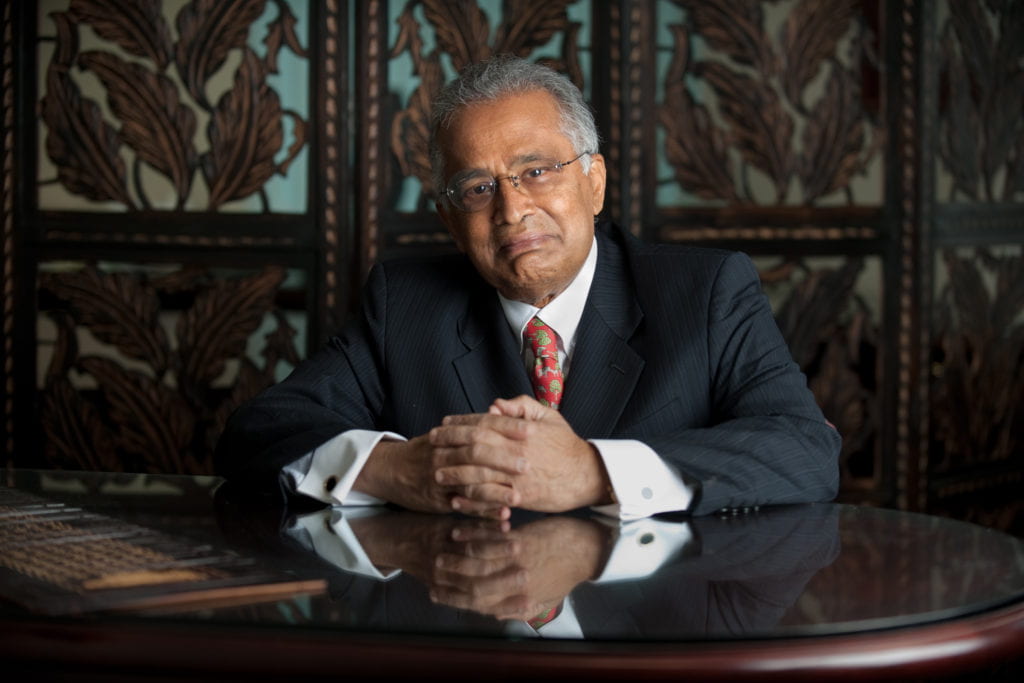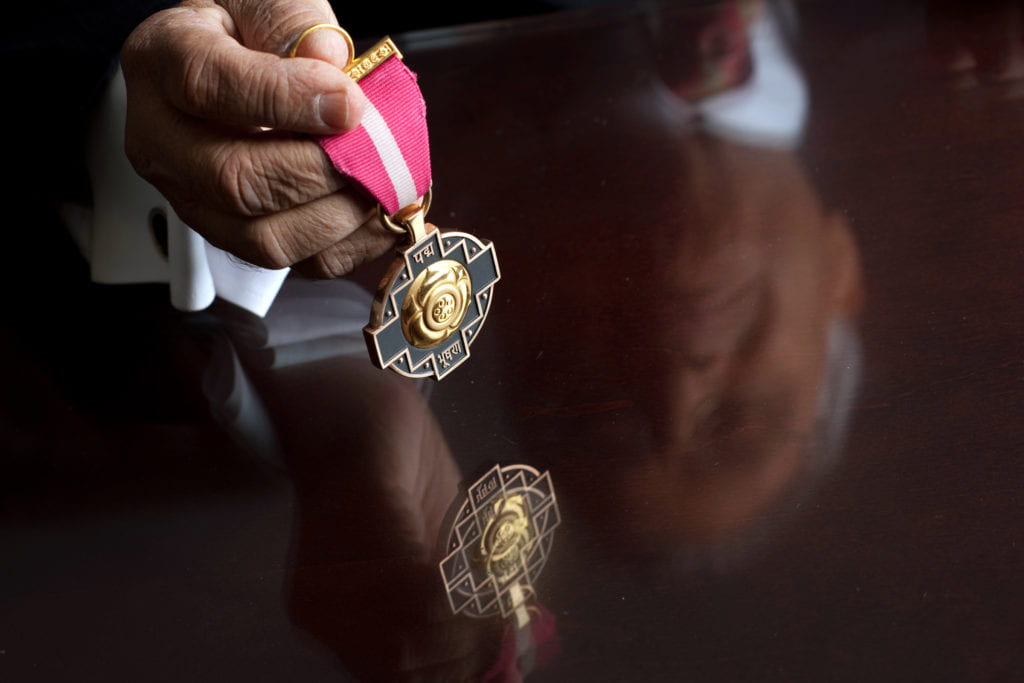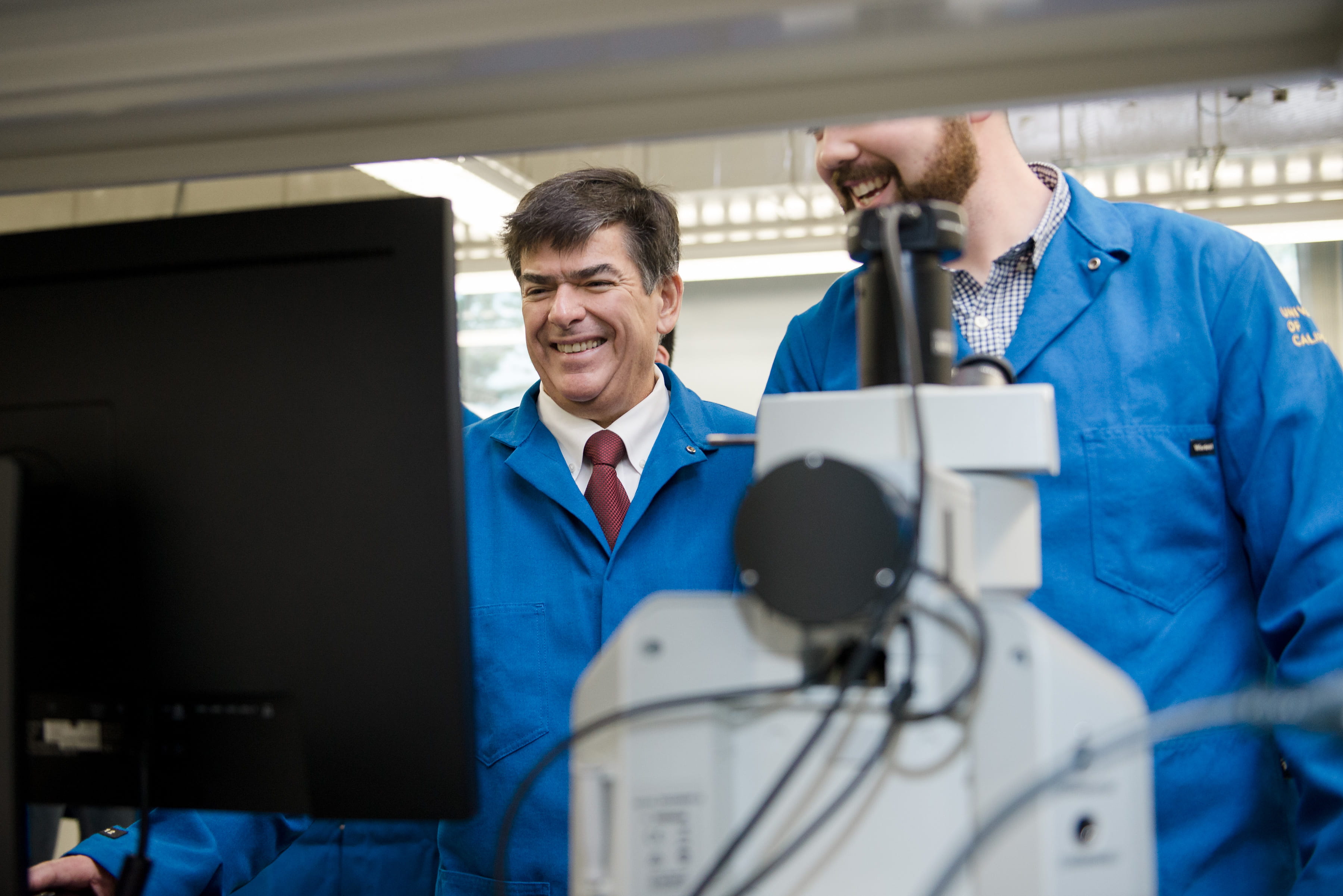Celebrity scientist
In latest honor, UCI engineering professor accepts coveted medal from president of his homeland, India
As a boy in India, Satya Atluri was thrilled to hear the voice of U.S. President John F. Kennedy on the radio, vowing to put a man on the moon. It fueled his own dreams, and he grew up to become an internationally recognized aviation and mechanical engineer.
On April 20, Atluri, now a UC Irvine Distinguished Professor, returned to his native country to receive its Padma Bhushan award “for distinguished service of high order in the field of engineering and science.”
In an ornate ceremony at the imposing governmental compound in New Delhi, Atluri clasped his hands together and gave a slight bow as the heavy pink-and-gold medal was draped over his shoulders by Indian President Pranab Mukherjee. He was told it was the first such civilian honor conferred upon anyone in the University of California system.
“I was very touched and rejoiced in the incredible diversity that is India,” Atluri says. “The 50 women and men decorated by the president come from various ethnic, racial, linguistic and religious groups that make up [the nation], and no two of even the same gender were dressed alike. I plan to show the video of the ceremony to my students to let them see what diversity and inclusivity really implies!”
In an interview in his campus office prior to the grand event, he reminisced about his childhood, engineering and computational studies, professional battles and joys, and the cultural differences between his country of birth and adopted home. A plainspoken, highly regarded researcher and teacher, Atluri is a strong advocate for women’s rights, faculty recognition and other issues.
An American citizen for decades, he has been active professionally in many countries, including as founder of the International Conference on Computational & Experimental Engineering & Sciences. He has also served on key fact-finding missions for government agencies and officials.
When Prime Minister Indira Gandhi was assassinated in 1984 and her son Rajiv Gandhi succeeded her, Atluri was among a group of scientists pulled together to advise him on the nation’s future. Their main finding: India could be a technological powerhouse if it educated its people and developed the right tools. Gandhi went on to modernize India’s telecommunications industry and education system and expand science and technology initiatives.
In the U.S., in the years after the roof of an Aloha Airlines jet ripped off, Atluri was part of a Federal Aviation Administration advisory committee on how to avoid reoccurrences. Wear and tear on airplane materials had proved to be the culprit.
Atluri did groundbreaking mathematical work, including inventing the so-called “meshless method” that has aided the design of safer materials in the decades since. Throughout his career, his work has encompassed theoretical, applied and computational mechanics of solids and fluids; and structural longevity, failure prevention and health management.
A proud alumnus of the Indian Institute of Science, Atluri came to Boston to earn his doctorate at the Massachusetts Institute of Technology. He smiles when asked about his first memory of America. Exhausted by the long flight, he was given a dorm key and misdirected to a room of sleeping college girls. They shrieked when he opened the door and turned on the light.
Atluri, who grew up with sisters, handled the situation with aplomb. Long-married and the father of two daughters, he speaks out against the mistreatment of females in India at every chance.
“It’s outrageous,” he says of the recent rape of a young girl there. He has been interviewed extensively by Indian newspapers and magazines for winning the national science award and, while grateful, always speaks up for women’s rights.
America has its problems and strengths too, Atluri says. As a former chair of the panel that recommends National Medal of Technology recipients, he notes that winners here garner scant attention in a society hungry for the latest celebrity news. India, in contrast, values its scientists as well as its Bollywood stars. Still, Atluri says, he loves American entrepreneurship and creativity – and UC Irvine.
“I want to share my immense joy on this occasion and thank UCI for giving me a job and an opportunity to think, to teach and to publish,” he said in an email to engineering Dean Gregory Washington and others when he first learned of the Padma Bhushan award.
Atluri will soon experience how another culture treats its scientists. Within an hour of his return from India, he received an email informing him that he’d been elected to the Academy of Athens. “While I’m no Aristotle, it is gratifying to be selected,” he says.
Despite all the accolades, Atluri is adamant that what he enjoys most is teaching eager young engineers, just as he once was.


